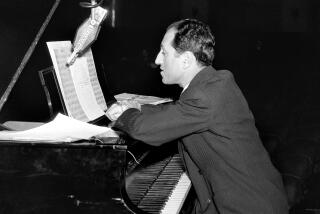Roberts Uncovers New Dimension to ‘Rhapsody in Blue’
- Share via
Marcus Roberts’ emergence as one of the most vital jazz voices of the mid-’90s continued to blossom Friday night at Glendale’s Alex Theatre.
From the moment the 33-year-old blind pianist sat down at his keyboard, quietly made a few humorous comments and dug into a set of improvisations, it was clear that he has a rare capacity to interpret jazz in a manner that opens the music to a wide and varied audience. Performing before a full house as the first entry in the six-event “Playboy Jazz Festival in Concert” (which continues into April), Roberts delivered on his often stated desire to “present the piano.” He offered music ranging from trio selections to performances with a larger band, and--in the program’s climax--a rendering of his imaginative reworking of Gershwin’s “Rhapsody in Blue.”
The evening began with a trio set, featuring Roberts, drummer Jason Marsalis and bassist Rueben Rogers. The Gershwin theme (which has preoccupied Roberts lately) made its appearance quickly with two standards, “Our Love Is Here to Stay” and “Summertime.” In both, the essential aspects of Roberts’ skill as a musical communicator were apparent in his ability to stretch out improvisationally while still remaining in touch with the melodic content and the emotional message of the song. Equally important, he made the music fully interactive, opening space for a brilliant drum solo from Marsalis on “Our Love” and spotlighting Rogers with a bowed bass reading of the melody on “Summertime.”
*
The large ensemble segment that followed was equally captivating. Roberts, who is quick to acknowledge the influence of the tradition-oriented thinking of Wynton Marsalis (his boss for six years in the late ‘80s), offered several compositions tinged with the timbral densities of Duke Ellington. And the ensemble, especially in the solo work of trumpeter Marcus Printup and clarinetist Ted Nash, possessed that rarest of qualities, the capability of playing with a collective voice.
Roberts’ recording of the Gershwin “Rhapsody” is an attention-grabbing, major reinterpretation of the work. Performed in concert with the assistance of the players of the Academy of the Ascension, it was even more stunning. The rendition, which moved elements around, inserted improvisations and energized the period rhythms with a driving feeling of swing, brought the “Rhapsody” alive in a fashion that far transcended traditional, by-the-note orchestral interpretations. Roberts’ piano, brisk and to the point in written passages, romped freely through the cadenzas and the improvisations, adding an earthy taste of the blues.
It was a performance that Gershwin surely would have loved. By opening the work to the creativity of improvisation and by removing it from its usual dated context and placing it in a spontaneous jazz environment, Roberts has given the “Rhapsody” a vigorous new future.
More to Read
The biggest entertainment stories
Get our big stories about Hollywood, film, television, music, arts, culture and more right in your inbox as soon as they publish.
You may occasionally receive promotional content from the Los Angeles Times.










